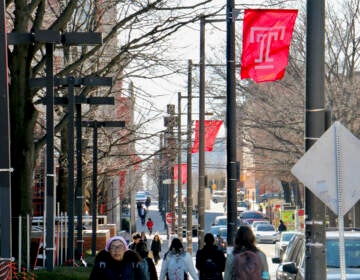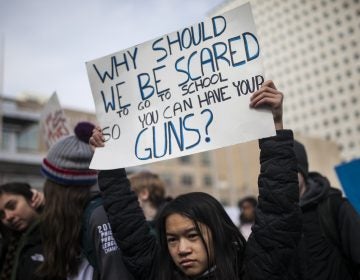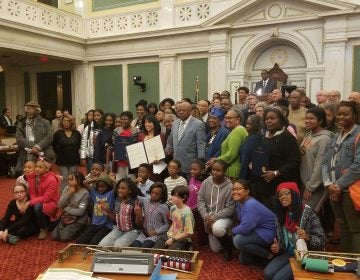Villanova professor says ‘Never Again’ student activists won’t take no for an answer
Morning Edition host Jennifer Lynn speaks with Villanova education professor Jerusha Conner about youth activism and the 'Never Again' movement against gun violence.
Listen 6:14
Jerusha Conner is an associate professor at Villanova University. (Kimberly Paynter/WHYY)
Saturday’s March for Our Lives rallies in Washington, D.C., and in sister-communities like Philadelphia, will draw attention to demands – primarily by young people – to ban assault weapons, like the one used in the deadly school shooting in Parkland, Florida last month.
Morning Edition host Jennifer Lynn spoke with Villanova Education and Counseling professor Jerusha Conner about the current “Never Again” movement against gun violence. Conner studies student activism, and her research finds young people can truly shape public policy and make personal gains through activism.
–
What impact is this anti gun violence movement having right out of the gates?
I’m noticing that there has been policy change already — we’ve seen legislation in Florida. We’re seeing incredible media attention and the way that youth have taken the reins of the narrative and shifted the way the issue is being discussed. So it’s having an impact I think on public opinion. We’re seeing parents joining and being politicized, too. I know the local Moms Demand Action group has seen a huge increase in turnout at events they’ve had around gun control. We’re seeing a lot of people joining the effort and the base growing larger and larger.
And I think we’re all impressed with what’s going on. Why is it having such an impact?
You know, a lot of it has to do with the fact that the youth who are speaking out endured an unspeakable tragedy and horror. And as always the media attention is focused on the aftermath. But they’re privileged youth who use their privilege to reshape the narrative in ways that youth who have been organizing against gun violence in Philadelphia and Oakland and other communities around the country have not been able to do because they haven’t had that kind of media spotlight and attention. But there’s also, you know, a moment where the ground is soft. From a policy standpoint, there’s a lot of public support. I think seven out of ten now favor gun control or gun reform. There is capacity locally in terms of putting pressure on politicians to enact change.
Saturday’s anti gun violence March is powered by many things – grief, anger, fear, desire to stop more attacks. What in your experience are the strongest motivators that tip students toward activism?
So, I have a study underway at Villanova with a team of Villanova students where we’re looking at college student activism and what were the factors that led them to identify as activists, and we do ask them about the motivating emotions. Usually it’s frustration and a desire to effect change. But number two is love – desire to care for others and create the world they want to see. So this sense of critical solidarity is a really powerful motivator.
Young activists through the generations have wanted to take over the wheel. They want to be heard, they want to push for change. Whether it was during the Vietnam War, The Civil Rights movement, Occupy Wall Street, Black Lives Matter protests, tell us about this need to take things in one’s own hands.
I think of it as a basic right that people have a say in the decisions that affect them. And that is a right that has been instantiated in the United Nations treaty or Convention on the Rights of the Child in Article 12 very clearly. Unfortunately, the U.S. is the only country to have not ratified this treaty and recognize that right that children and young people have. But I don’t think the youth are waiting for that right to be recognized by adults. They are speaking up and demanding change for themselves and making sure they have a voice.
So many marchers this weekend are children of the mass shooting generation. Terrible to even describe that as a generation that exists. How is their point of view different from older people who didn’t grow up with the threat of school shootings?
Well youth will always surface different issues and different concerns than the older generation if we give them the chance to. Focusing on mass shootings is one piece of it. But we also have to think about gun violence more broadly, especially in places like Philadelphia, where young people are severely traumatized and coming to school having lost friends and family members to gun violence on a regular basis. It’s not a new phenomenon for them to be thinking about and talking about gun violence.
Apart from mass shootings, do you study the the difference in privilege and the affects of student protest and activism?
My current study at Villanova is looking at student activism nationally and our sample includes students who are low income college students, first generation college student activists as well as more privileged college student activists. And we’re really interested in how they are working together and what they are learning from each other, and the Parkland youth are starting to come to this, too. I think that “Never Again” students are finding ways to amplify the voices of their counterparts in under-resourced schools. They’re still staying pretty strictly on message with respect to their demands for assault weapons, but I think they are starting to try to amplify the voices and perspectives of those who have been left out of this broader national conversation.
WHYY is your source for fact-based, in-depth journalism and information. As a nonprofit organization, we rely on financial support from readers like you. Please give today.





